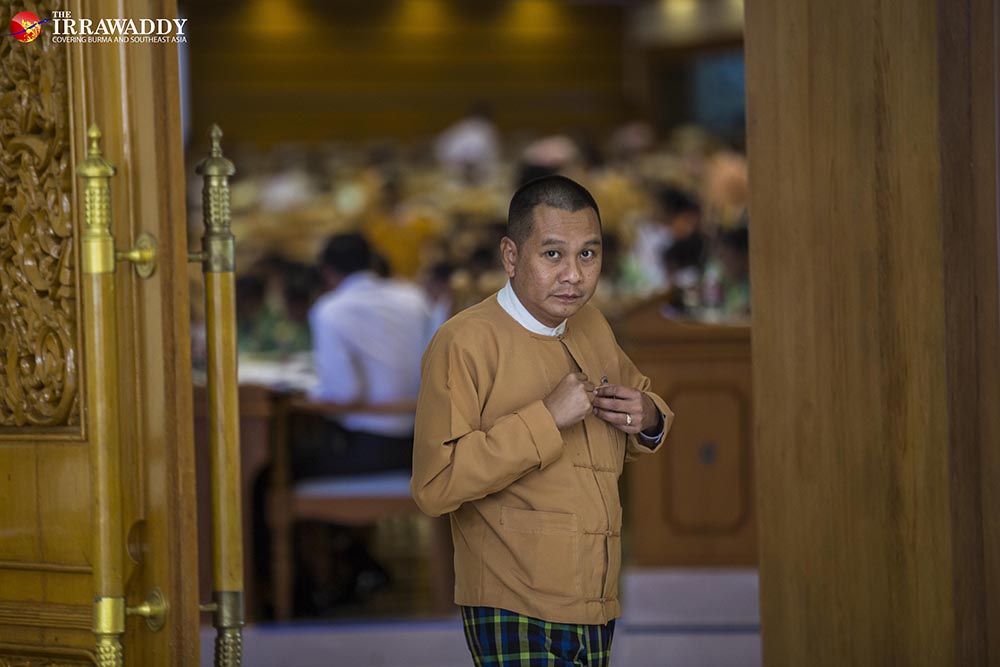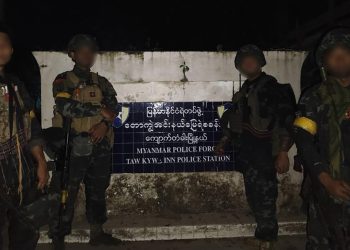YANGON—Among the 114 proposed changes to the Constitution submitted by the ruling National League for Democracy (NLD), two are fundamental to the effort to achieve political reform in the country.
The first calls for a reduction in the proportion of seats in Parliament reserved for the Myanmar military, or Tatmadaw.
Currently, 25 percent of seats in all parliaments, nationally and regionally, are occupied by unelected military officials under the Constitution’s Article 14 and related provisions. This key political privilege allows the military to intervene in the legislative process and discussions of the country’s affairs, and gives it powers beyond territorial defense.
Military MPs have provided the stiffest opposition to the NLD since it took power in 2016, strongly objecting to comments or proposals of elected representatives if they are deemed to have breached the Constitution or harmed the military’s image.
In the proposals submitted last week, the NLD suggested gradually reducing the military’s share of seats to 15 percent after the 2020 election, 10 percent after 2025 and 5 percent after 2030. The proposals do not mention removing the military from Parliament entirely.
In contrast to the NLD’s goal of a gradual reduction, the ethnic parties want to remove the military from Parliament in one fell swoop.
The NLD seemingly thinks its moderate approach will be more acceptable to military MPs. Nobody knows if it will work.
But we can be sure that if the NLD sought to get rid of all the military MPs from Parliament right away, the resistance would be even stronger than it is now.
The other of the two most important proposals would remove the military’s effective veto over any proposed amendment to the Constitution.
Under the Constitution’s Article 436, proposed changes to the charter require the support of more than 75 percent of lawmakers, meaning it is impossible to make any change without military approval.
The NLD proposes changing the requirement for approving a charter amendment from more than 75 percent of Parliament to “two-thirds of elected representatives,” excluding the military appointees.

If the NLD’s proposed amendment passes, elected representatives would have the power to amend the widely criticized charter.
While it is unlikely that the military will accept all of the NLD’s proposed amendments, it would seem reasonable that it would accept one of the two above proposals, which would be enough to begin the process of democratizing and demilitarizing the Constitution.
Reducing the proportion of parliamentary seats reserved for military MPs to less than 25 percent, or lowering the threshold for approving a constitutional amendment to below 75 percent of lawmakers, would remove the powerful military’s ability to block constitutional reform, making it much easier to amend individual undemocratic provisions in the charter, as well as those that prevent the establishment of a federal union.
Yet, the military appointees have rejected all efforts by the NLD and the ethnic parties over the past year to reform the Constitution through a parliamentary committee. Instead, they submitted their own amendment proposals, all of which seek to protect the military’s interests.
Asked what action the NLD plans to take if the military doesn’t approve its proposed amendments, NLD Upper House lawmaker Dr. Myat Nyana Soe said, “Nothing can be done if the proposed amendments aren’t approved by more than 75 percent of MPs, as required under the current charter.” Dr. Myat Nyana Soe is the secretary of the Charter Amendment Committee, which compiled recommended changes from more than a dozen political parties and drafted the proposed amendments over the past year.
“And that’s the major hurdle for reform,” he said. But he added that if all groups put aside their own narrow interests and work together for the good of the country, nothing would be impossible.
Indeed, some lawmakers are still hopeful that long-awaited constitutional reform is possible.
“The commander-in-chief said the military is not opposed to constitutional amendment. The USDP [the military’s proxy party] also said it wants to amend the charter. We, the ethnic parties and the NLD, are also pushing for that. So, I hope some of the amendments will be passed,” an ethnic lawmaker said.
You may also like these stories:
Myanmar Rebel Armies Extend Truce but Fighting Continues
China Quietly Pushing Myanmar to Back Its Development Plan for Irrawaddy River
Why Does the Myanmar Military Rebuff the Work of the Constitutional Amendment Committee?
















